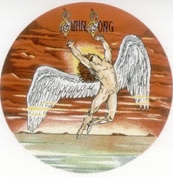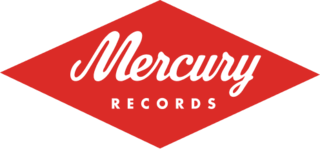Related Research Articles

Men at Work are an Australian rock band formed in Melbourne in 1978 and best known for breakthrough hits such as "Down Under", "Who Can It Be Now?", "Be Good Johnny", "Overkill", and "It's a Mistake". Its founding member and frontman is Colin Hay, who performs on lead vocals and guitar. After playing as an acoustic duo with Ron Strykert during 1978–1979, Hay formed the group with Strykert playing bass guitar and Jerry Speiser on drums. They were soon joined by Greg Ham on flute, saxophone, and keyboards and John Rees on bass guitar, with Strykert switching back to lead guitar. The group was managed by Russell Depeller, a friend of Hay, whom he met at La Trobe University. This line-up achieved national and international success during the early to mid-1980s.

Swan Song Records was a record label launched by the English rock band Led Zeppelin on 10 May 1974. It was overseen by Led Zeppelin's manager Peter Grant and was a vehicle for the band to promote its own products as well as sign artists who found it difficult to win contracts with other major labels. The decision to launch the label came after Led Zeppelin's five-year contract with Atlantic Records expired at the end of 1973, although Atlantic ultimately distributed the label's product.
The music of New Zealand has been influenced by a number of traditions, including Māori music, the music introduced by European settlers during the nineteenth century, and a variety of styles imported during the twentieth century, including blues, jazz, country, rock and roll, reggae, and hip hop, with many of these genres given a unique New Zealand interpretation.

Live on Two Legs is the first major live album by the American alternative rock band Pearl Jam, released on November 24, 1998, through Epic Records. The album has been certified platinum by the RIAA in the United States.

Mercury Records is an American record label owned by Universal Music Group. It had significant success as an independent operation in the 1940s and 1950s. Smash Records and Fontana Records were sub labels of Mercury. Mercury Records released rock, funk, R&B, doo wop, soul music, blues, pop, rock and roll, and jazz records. In the United States, it is operated through Republic Records; in the United Kingdom and Japan, it is distributed by EMI Records.

Timepieces: The Best of Eric Clapton is a greatest hits album by British musician Eric Clapton. The album was originally released by RSO/Polydor Records in April 1982. The following year a second volume, Time Pieces Vol.II Live in the Seventies, was released by the label. The album has been reissued several times and has been awarded certifications in several regions. Billboard reported the album sold more than 13,400,000 copies worldwide.
Peter William Dawkins was a New Zealand record producer and musician, best known for his late-1960s to mid-1970s New Zealand hits and his 1970s productions for Australian-based pop artists, including Dragon, Australian Crawl and Air Supply. He won multiple production awards, including the Countdown Producer of the Year. In the late 1980s, he developed Parkinson's disease.

Shona Laing is a New Zealand musician. She has had several hits in her native country, as well as a few minor international hits, most notably "(Glad I'm) Not a Kennedy" and "Soviet Snow". Laing contributed to Manfred Mann's Earth Band album Somewhere in Afrika and contributed music to, and appeared in, the 1985 action film Shaker Run.

Sir John Edward Rowles is a New Zealand singer. He was most popular in the late 1960s, 1970s and early 1980s, and he is best known in New Zealand for his song from 1970, "Cheryl Moana Marie", which he wrote about his younger sister.

Zeus B. Held is a German music producer and musician, known for his work in the 1970s, 1980s and 1990s. He was involved with several artists of the krautrock, disco, and new wave era, such as Birth Control, Rockets, Gina X Performance, Dead Or Alive, John Foxx, Fashion, and Men Without Hats on their successful album Pop Goes the World.
Viking Records was an independent record label that featured many New Zealand and Polynesian recording artists.

Kimbra Lee Johnson, known mononymously as Kimbra, is a New Zealand singer and songwriter. Known for mixing pop with R&B, jazz and rock musical elements, her accolades include four ARIA Music Awards, two Grammy Awards and seven New Zealand Music Awards. Her musical influences range from Prince and Minnie Riperton to Björk and Jeff Buckley.
Universal Music New Zealand is the New Zealand subsidiary of the Universal Music Group (UMG), the world's largest music company. Universal Music New Zealand's corporate headquarters are located in Auckland, New Zealand.
Rob Aickin was New Zealand's top record producer in the late 70's early 80s. He produced many gold and platinum records for artists like, Patsy Riggir, Hello Sailor, Golden Harvest, Th Dudes With Dave Dobbyn, Toni Williams, Murray Grindlay and many others while working for Stebbing Recording studios.
RTC is a New Zealand record label which licensed recordings from overseas Independent labels in the United States and in the United Kingdom.
"The Bridge" was a #1 chart hit in 1981 for New Zealand singer Deane Waretini, and his backing group The Rising Stars. This also marked a first. It was the first Maori language record to hit the no 1 spot in New Zealand. "The Bridge" is an example of an artist in the 1980s contributing to the success of a record. This was done by kick starting the process in the beginning by self-financing the record, having a hand in its own promotion by employing various tactics to get the record heard by the public.
Music for Leisure was a budget record label in New Zealand that released many compilation albums. It also handled re-releases of other labels.

This Heart This Song is the debut studio album by New Zealand singer and songwriter Sharon O'Neill. This Heart This Song debuted and peaked at No. 12 in New Zealand in February 1979.

Sharon O'Neill is the second studio album by New Zealand singer and songwriter Sharon O'Neill. Sharon O'Neill peaked at No. 5 in New Zealand in March 1980. The album was released in Australia in August 1980 under the titled Words, with the inclusion of "How Do You Talk to Boys".
John Christopher Parry is a New Zealand record producer and former musician, known for being the former manager and producer for The Cure and for founding Fiction Records.
References
- ↑ Billboard, 15 June 1974 Page 44 International News Phonogram Gives Labels More Autonomy In Structural Changes
- ↑ New Zealand Musician, Vol.18 No. 8 February / March 2015 Page 21 moments like these - Curated by Trevor Reekie
- ↑ Billboard, June 12, 1982 Australia and New Zealand, Market Leaders Surveyed
- ↑ Audio Culture, 4 May 2016 John McCready part 3 - the CBS years Murray Cammick